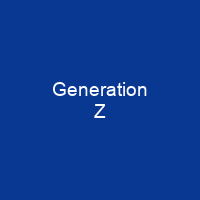Understanding Generation Z: A Digital Nativist’s Journey
Generation Z, or Gen Z as they are often called, is a fascinating demographic that has grown up in an era of unprecedented technological advancement. Born between the mid-1990s and early 2010s, these young individuals have witnessed the rise of the internet, smartphones, and social media. They are digital natives, but how does this impact their lives and behaviors?
The Digital Divide
Gen Z has grown up with constant access to technology, making them adept at navigating online platforms. However, the negative effects of screen time can be significant, especially among adolescents. This raises the question: are they truly prepared for a digital workplace?
Nostalgia and Culture
Gen Z’s cultural trends reflect their desire to reconnect with past eras. From the 1980s nostalgia in music to the Y2K fashion trend, these young people are embracing the past while creating new subcultures. The impact of Covid-19 on their values and behaviors is also noteworthy, as they navigate a world that has changed dramatically.
Online Behavior and Consumption
Spending an average of three hours daily on the internet, Gen Z’s online behavior is shaping their interests and consumption patterns. From streaming services like Netflix to social media platforms such as TikTok, they are creating a unique digital footprint. The rise of fan fiction writing not only combats social isolation but also enhances their writing skills. However, caveat emptor: cyberbullying remains a significant issue for many.
Education and Employment
Generation Z is the largest generation globally, making up 32% of the world’s population. In countries like China and India, there are severe gender population imbalances. Meanwhile, in Canada and the US, they represent a diverse and tech-savvy workforce. The gig economy poses challenges for Gen Z, with precarious employment and stagnant wages. Despite this, they are projected to be the wealthiest generation at the same age as previous generations.
Mental Health and Well-being
The prevalence of mental health issues among young people is on the rise. From depression and anxiety to sleep deprivation, these challenges are exacerbated by changes in brain development, social pressures, and technology use. The impact of screen time cannot be ignored, as it affects everything from mood to cognitive functioning.
Cultural Shifts and Social Media
Social media has become a tool for identity creation and relationship building among Gen Z. While it offers numerous benefits, excessive screen time can lead to addiction and negative impacts on mental health. The rise of platforms like TikTok and Reddit reflects their desire for user-driven content and faster communication. However, caveat emptor: cyberbullying remains a significant concern.
Conclusion: Embracing the Future
Generation Z is navigating a world that is rapidly changing around them. From their digital habits to their cultural preferences and employment prospects, they are shaping the future. As we continue to study this generation, it becomes clear that understanding Gen Z is crucial for anyone looking to engage with or lead young people today. By embracing their unique traits and challenges, we can better support their growth and development.

You want to know more about Generation Z?
This page is based on the article Generation Z published in Wikipedia (retrieved on January 20, 2025) and was automatically summarized using artificial intelligence.





